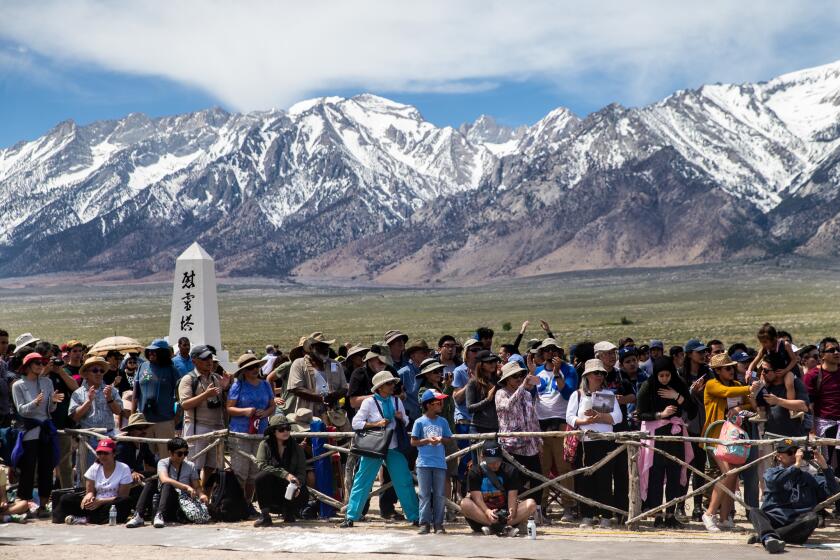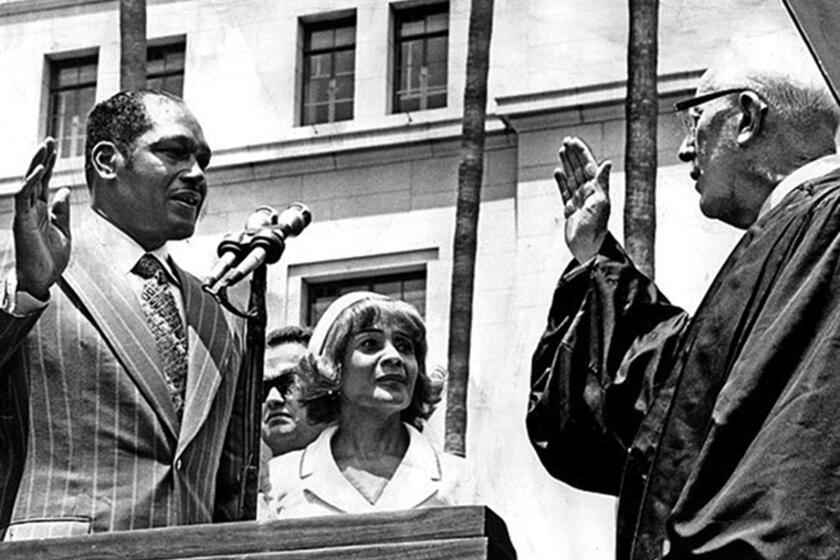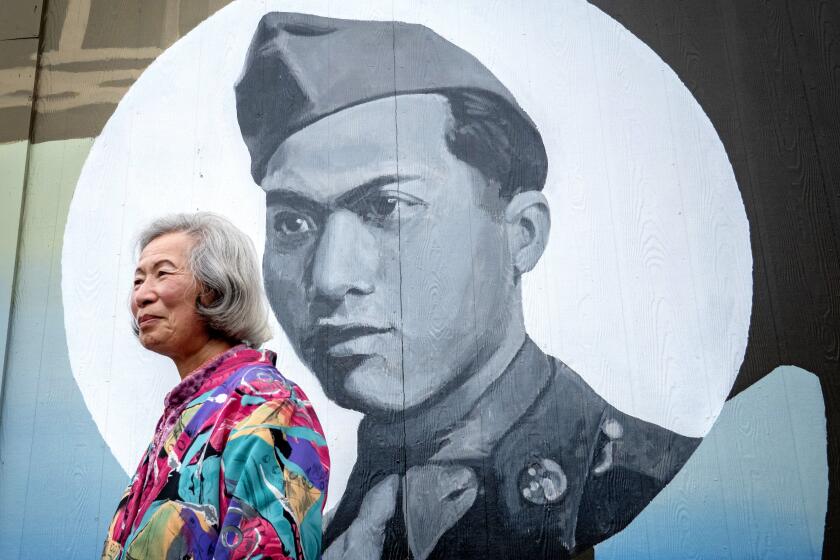A bill banning Chinese citizens from buying property has some wondering if they’re welcome in Texas
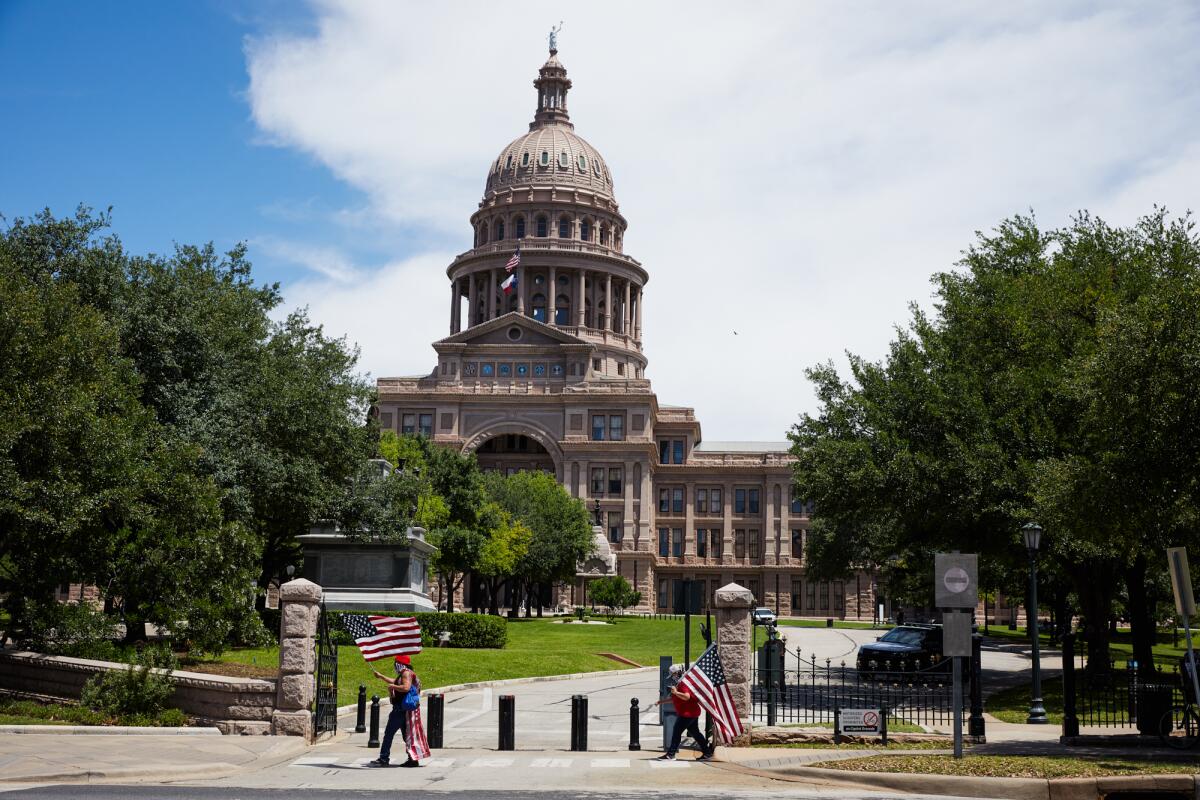
Isaac Jing is starting to reconsider his future in Texas.
The engineer works for a large tech company in Austin and owns a house in the city. He’s lived here since finishing grad school in Pennsylvania four years ago, and he invests in real estate as a side gig. But he worries that could change under a bill that would bar him from buying new property in Texas.
The reason: He is a Chinese citizen.
Details of the proposed law, which would also target citizens of Iran, North Korea and Russia, are still being worked out, according to its Republican sponsor. But Jing isn’t the only one anxious about what the coming months in Texas might hold.
He recently joined a protest at the Texas Capitol over the legislation, which arrives as anti-Asian hate crimes have been on the rise and, for critics, evokes an ugly history of anti-Asian discrimination facilitated by state and federal law.
Jing wasn’t planning to leave the state just yet, but he and his wife have already talked about moving to San Diego or the San Francisco Bay Area, he said. The direct implications for his investments or purchasing a home in the future were one concern; the sentiment behind the bill was another.
Did he still feel welcome in Texas?
“I feel like most people like me,” Jing said. “On the other hand, if this law passes — wow.”
The bill’s most prominent champion, Texas Gov. Greg Abbott, has said his goal is to stop “countries that are hostile to the interest of the United States” from buying up farmland and other land. Other Republican leaders, including those, like Abbott, rumored to be open to 2024 presidential runs, are eyeing more narrow property restrictions focused on agriculture as part of a tough-on-China push. Some Democrats, too, have expressed similar concerns.

Discord between the U.S. and China has only intensified since Abbott tweeted last month that he would sign the bill. Last week, Americans were unnerved by a Chinese balloon suspected of conducting surveillance floating across the United States. Secretary of State Antony J. Blinken subsequently canceled a trip to China, and once the balloon moved off the South Carolina coast, the U.S. military shot it down.
The U.S. on Saturday downed a suspected Chinese spy balloon off the Carolina coast after it traversed sensitive military sites across North America and became the latest flashpoint in tensions between Washington and Beijing.
The episode is expected to heighten pressure on lawmakers to counter China. And even though Chinese investment in U.S. agricultural land and other acreage remains very small — “less than 1 percent of foreign-held acres,” according to a USDA report covering 2021 — the Texas bill, which extends to all property, portends a possible future, and its risks. It has already had a disquieting effect among Texans of Chinese descent.
The bill’s author, Republican state Sen. Lois Kolkhorst, contends that once the details are worked out and exceptions added, the bill won’t apply to U.S. citizens and lawful permanent residents. But the path to U.S. citizenship can take years, and critics fear the expansive bill could ease the way for broader discrimination.
The Texas legislation will make some people more “willing to express their hatred toward certain race groups,” said Hao Zhu, an associate professor at the University of Texas at Austin. “From COVID, already just because of our skin color, we were hated.”
Zhu attended the rally with her husband and 2-year-old son, who was balanced in his dad’s arm holding tiny Texas and American flags.
“Look around,” Zhu said, as families and businesspeople — many waving American flags and chatting in English or Mandarin — walked past the Capitol. The bill is not affecting a “security issue at the national level” but “regular people’s lives.”
She started to bring up fears about her son going to school, then paused, in tears.
Masako Miki came to this picturesque landscape of snow-tipped mountains and desert shrubs Saturday on a mission of remembrance.
She explained later that even though she didn’t think she and her family’s rights would be directly affected by the bill, she worried about where it might lead. She pointed to the incarceration of Japanese Americans during World War II.
“We feel pretty safe by and large in the Austin community,” she said. “Maybe in the 1940s, the Japanese Americans [didn’t] feel unsafe.”
A growing movement
In 2021, long before Americans noticed the white balloon drifting over the western U.S., Texas lawmakers enacted legislation that blocks companies tied to China and the three other countries from entering into critical infrastructure agreements.
Their move followed a Chinese billionaire’s large land purchase and proposed wind project in southwest Texas. Greenalia, a Spanish company, has since acquired the wind farm project, according to a spokesperson. The Chinese investor could not be reached for comment.
The sponsor of the new Texas bill, Kolkhorst, cited “the purchase in 2021 of over 130,000 acres in South Texas by a Chinese-controlled firm” and its proximity to an Air Force base as among the concerns that necessitated further legislation. In addition to banning citizens from the four countries from buying or acquiring property, the bill restricts their companies and governments from buying Texas land. It does not address foreign nationals from those countries who already own property in the state.
The bill in some ways mirrors a broader legislative push to target foreign investment in agricultural and other land, particularly by the Chinese Communist Party. A new House select committee on China is expected to look at this issue, and bipartisan bills introduced last month in the U.S. House and Senate would increase review of foreign investment in U.S. agriculture. A California bill, authored by a Democrat, to restrict foreign ownership of agricultural land passed the Legislature last year but was vetoed by Gov. Gavin Newsom.
But in the vein of former President Trump, ambitious Republicans are particularly focused on this issue as they jockey over China.
In September, Florida Gov. Ron DeSantis, widely viewed as a Republican presidential contender, warned of China’s influence “from server farms to farmlands” and proposed prohibitions on certain foreign purchases of agricultural land and land near military bases. Recently, Republican Gov. Glenn Youngkin of Virginia also put out a video asking for a bill prohibiting Chinese Communist Party purchases of farmland.
California turned anti-Chinese and anti-Japanese sentiment into a national movement.
China is “going to be a really big topic for both parties this year, especially for the Republicans,” said Scott Jennings, a GOP strategist. “Last week’s events, in my opinion, put a lot of pressure on Joe Biden to also show some toughness on China.”
Jennings said he expected the movement targeting the Chinese Communist Party and agricultural land “to grow, honestly, especially now with the balloon story,” he said. “It’s a reminder: You cannot give the communists the benefit of the doubt. I think most Americans will look at this and say, ‘I can’t believe they’re allowed to buy any land.’”
The Texas bill, by currently including Chinese citizens, in effect does not distinguish them from China’s Communist Party.
It signals a possible legislative direction for Republicans, but also the pitfalls: Abbott has more recently suggested the bill won’t affect people who “intend to be citizens.”
Abbott’s office did not respond to requests for comment. Kolkhorst’s office declined repeated requests for interviews.
Democrats “know the bill is going to have safeguards for all of our Chinese community that seeks to buy a home,” said Bobby Eberle, the Fort Bend County Republican Party chairman. “That’s just obvious.”
But several people at the rally described waiting up to a decade to obtain a green card, and it remains unclear how a ban might ultimately affect people with different immigration statuses.
In an 1885 expulsion, the city of Eureka, Calif., put its Chinese residents on two ships and kept them out for seven decades. Now, the Eureka Chinatown Project tells the story.
Some experts wonder whether policies that turn away from America’s democratic strengths will only hurt the U.S. in the long term.
“A ban that targets a person’s country of origin, particularly if it includes those on a pathway to U.S. citizenship, goes against everything that the United States stands for,” said Jessica Chen Weiss, a political scientist and government professor at Cornell University.
“There are better ways to scrutinize potentially problematic investments without resorting to sweeping measures that would undermine our values and reduce our appeal as a destination for global talent and investment,” she wrote in an email.
Despite Republican assurances that the proposed legislation, which hasn’t yet been referred to a committee, will undergo changes, some suggest it’s already had a chilling effect.
Lynn Yuan, the founder of a real estate firm in Austin, said her Chinese clients include tech workers, business owners and real estate investors. Almost all are U.S. residents, she said.
“None of those are related to government,” she added. But concerns over the bill have made some of them hesitate in moving their businesses to Texas. “If they could go to another location or even another country, why would they risk it?”
“Texas is our home!”
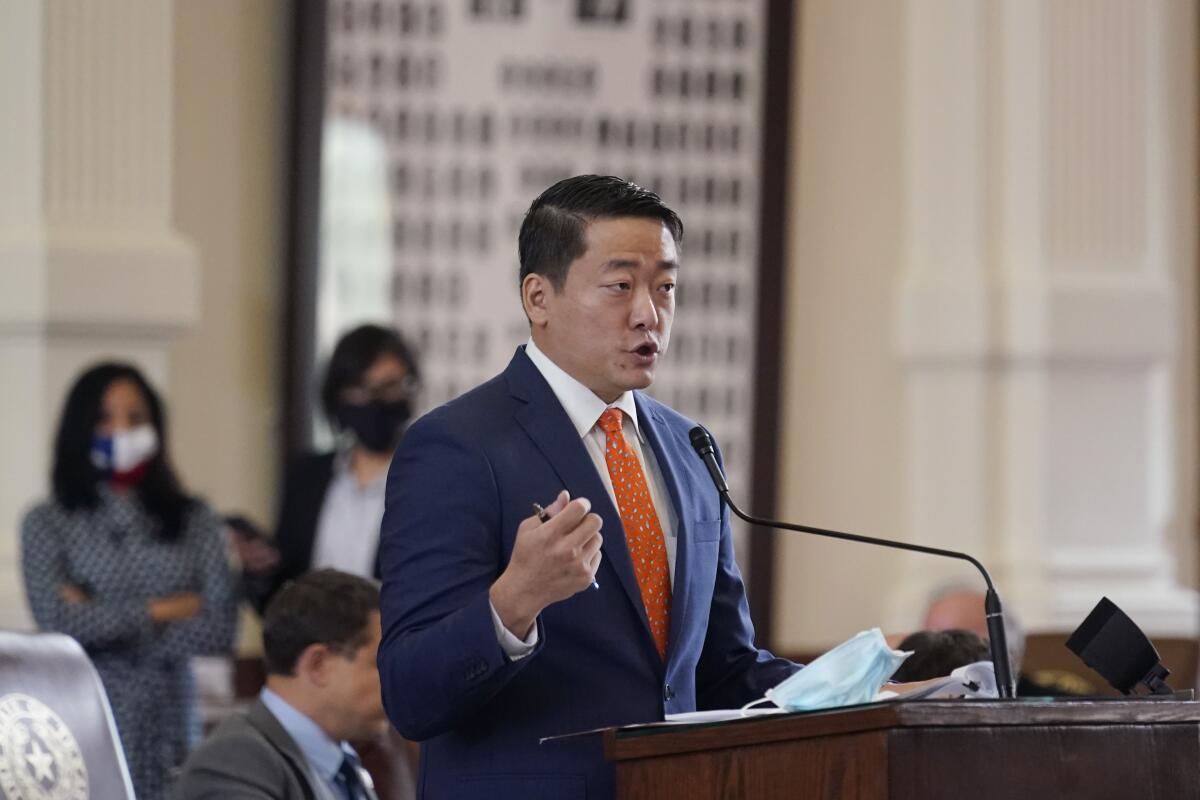
A measure that says some people “are less equal than others” is a “really dangerous thing,” said Texas state Rep. Gene Wu, a Houston Democrat. In an atmosphere of rising anti-Asian hate and violence, he said, “you have the government of one of the largest states in the nation saying these people are fair game.”
At the Austin rally, people held signs that said, “STOP Chinese Exclusion,” evoking the Chinese Exclusion Act, a 19th century law that blocked citizenship to Chinese residents in the U.S., affirming the exclusion of Asian immigrants from a 1790 naturalization law. A speaker also referenced “alien land laws,” racist laws in California and other states that restricted Asian immigrants and others from owning property, including agricultural land.
Lawmakers’ framing of the new bill as a national security measure also in some ways echoes the past.
Madeline Hsu, a history professor at the University of Texas at Austin, said that in historically justifying anti-Chinese immigration laws, Chinese immigrants were portrayed “as this threat to the civilization of the United States.”
The national security focus now might be through the lens of COVID-19, technology or property purchase, she added in an email, but in using those threats as justification, racially designated groups have been targeted.
At the rally, as people marched near the Capitol, seemingly ending up at the same place, some worried about the future for themselves and their families. And some reflected on what drew them to call Texas home in the first place.
“If people ask me, ‘Where are you from,’ I say, ‘I’m from Houston, Texas,’” Jim Wu said.
The U.S. citizen has lived in Houston for over two decades; he moved to the city from Beijing in 2001, got his MBA at the University of Houston and now works in international trade and business consulting.
“I love this state. I love this country,” he said. “Because of the freedom.”
During his H1-B-visa-holding period, Wu bought a condo, he said. But if people cannot buy a house, he wondered, “How can they survive?”
He imagined a scenario in which he’s asked to show his passport to buy a house.
If that happens, he said, then “it’s not a free country anymore.”
At the rally, chants of “stop Asian hate” and “stop discrimination,” were often interspersed with hopeful bursts of state pride: “We love Texas! Texas is our home!”
Liebelson is a special correspondent.
More to Read
Start your day right
Sign up for Essential California for news, features and recommendations from the L.A. Times and beyond in your inbox six days a week.
You may occasionally receive promotional content from the Los Angeles Times.

